
Now translated by José Maria Vieira Mendes, the play will be performed by Adriano Luz, Carolina Campanela, Francisco Vistas, João Barbosa, and Mário Sousa.
“Two beggars, Vladimir and Estragon, wait by a tree for someone named Godot. To pass the time, they engage in circular dialogues reflecting on existence, absurdity, and waiting itself. Other characters arrive, Pozzo and his servant Lucky, offering little clarity. Between the comic and the tragic, Beckett constructs a fundamental work of absurd theatre, exploring emptiness and the human condition in the face of waiting and uncertainty,” notes the play’s synopsis.
‘Waiting for Godot’ is on stage at Teatro do Bairro until November 2, with performances from Wednesday to Sunday.
Tickets are priced at 15 euros for the general public, with discounts for those under 25, over 65, and entertainment professionals. On Wednesdays, the price drops to 8 euros, also applicable to holders of the theatre’s friend card.
First published in 1952 in French, and staged for the first time the following year in Paris, the play became the first major success of the so-called Theatre of the Absurd and has been produced worldwide, often featuring actors famous from cinema or television.
Susan Sontag staged it in Sarajevo in 1993; the play was performed in apartheid South Africa, and American actor Wendell Pierce (known from ‘The Wire’ or ‘Treme’) awaited Godot in a post-Katrina New Orleans setting.
Patrick Stewart and Ian McKellen portrayed Vladimir and Estragon in this century, roles played last year in London by Ben Whishaw and Lucian Msamat. In New York, a current Broadway production features Keanu Reeves and Alex Winter.
“The play is a universal metaphor precisely because it was not designed as a metaphor for anything in particular. The true subject of ‘Waiting for Godot’ is that it’s about two tramps waiting for someone. It’s not the case that the true subject is in the metaphor. Plays designed to be a metaphor for particular correlatives have, I imagine, a very short lifespan. And then, of course, there’s the writing and the humor,” said Tom Stoppard about the play, as quoted by The Observer.
Beckett’s biographer, James Knowlson, told the BBC at the play’s 60th anniversary that its fame is due to its “ambiguities”: “People can read what they like into it.”




